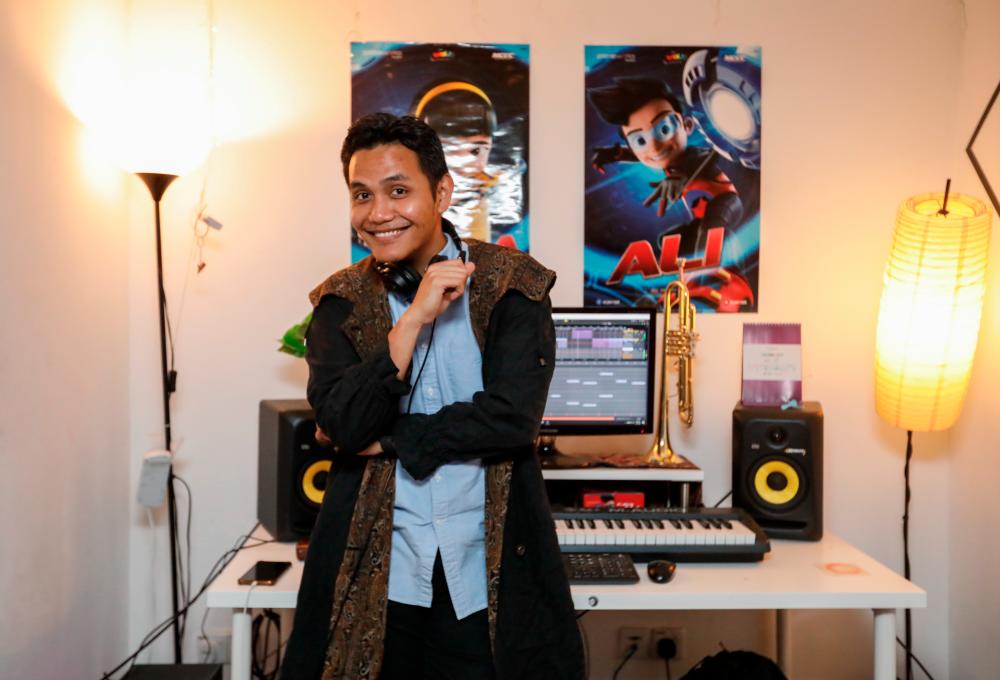IF THERE is one thing we seek more than wealth in modern times, it is validation, be it from peers, our family or society as a whole. In the case of 29-year-old Azri Yunus, validation came when his parents acknowledged his success as a film music composer.
He said: “At one point, I think I was too focused on music and it affected my studies badly. My dad, in his disappointment at that time, said it was better if I stopped it, and one thing that stuck with me was when he said: ‘Menyesal ajar main gitar’ (I regret teaching you to play the guitar). Now, I think my parents are proud.”
One of the fastest rising and eclectic composers in the country, Azri works for WAU Animation, the animation studio behind the Ejen Ali TV series and its recent film adaptation, which grossed RM30 million at the box office in its six weeks of screening. Part of the animated film’s most lauded aspect? Its score.
Having worked as a composer since 2011, Azri does the background music that ranges across various genres, and defines his job as “filling in the music for every scene in a movie or TV series”.
theSun recently met with Azri who spoke about his passion for music and how he found a career path that suits him.
How did you get into music and then start composing music for feature films?
“I began composing when I was studying in Multimedia University (MMU), but I have been playing the guitar since age 12, after my father taught me to play.
“He taught me the basics, and I picked up the rest by myself. At some point, he discouraged me from playing as my studies deteriorated. I did not progress further at that point.
“When I was in MMU, I was studying animation for about four years, but I also had a [band] at the same time. While studying animation, a subject called Film Studies exposed me to a wider variety of music usage, such as using music to tell and elevate a story.
“While this was going on, I was studying 3D visualisation for architecture. As I realised music was a crucial part of me, I had to drop animation.
“After moving to a different company, I did the audio, sound effects and music for an entire season of the animation that the company was working on.”
What were your parents’ reactions to the change from animation and architecture to music?
“In the beginning, they said: ‘Takkan nak buat music selamanya?’ (Are you going to play music forever?). I think it was a mindset thing, for parents and the older generation to think that making music and becoming an artiste are mutually exclusive.
“I had to tell them that I did not want to become an artiste, but that I wanted to make music for films. They let me try, but when I was working on animations that were not [well-known], they were not convinced. I just kept pushing forward.”
Did you expect the reception to the Ejen Ali The Movie score/soundtrack to be as good as it was?
“Firstly, I’m very grateful for the positive reception and feedback. When we first began the [TV series], the reception was lukewarm, and when we wanted to make the movie, there were fears that the audience wouldn’t know what it was, or if they even watched the series first.
“So we didn’t expect this. In relation to the score, I didn’t want the audience to watch the film, go back and forget about it. I wanted the music to move the audience and possibly even change their mindset. Based on the reception, I’m very grateful the audience resonated with the score.”
How do you give the songs/suites/tracks in Agen Ali their own personalities?
“Before I start, I ask for the ‘keywords’, like for Ejen Ali it was ‘gratitude’, [and] ‘loving our mother’. When I know the keyword, I research the emotions attached to it.
“For example, if it’s a picture of a mother hugging her child, I’ll try to find the saddest chord. It also depends on how a character looks like, such as the prominent colours on them. If it’s red, the sound has to be dangerous.”
Walk us through your creative process. How long does it take you to come up with and complete a single track?
“There are four components. I need to know the rhythm or pacing, what is happening with a character, the environment, and the story itself, like the motive at the moment, such as if someone says: ‘I’m going to kill that person’.”









